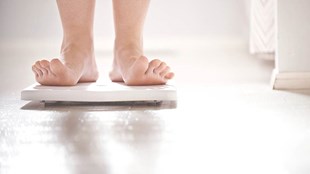I’m only going to say this once: monitoring your weight is one of the worst ways to measure progress when starting an exercise program!
Why? If there is no evidence of change in the right direction (which is often the case, despite the myriad health improvements we get as soon as we start exercising), we lose motivation and give up. We return to old sedentary habits – which we all know are killing us by the millions.
And all because of those pesky bathroom scales which merely measure how much of you is on the planet – not how healthy you are.
Dr Jinger Gottschall of Penn State University and I teamed up a couple of years ago to run a study on a group of individuals who were struggling to establish an exercise habit. These were normal folks who, like so many, just couldn’t find the will to exercise on a regular basis.
So, after lots of tests, we got them started on a plan. They started with three sessions per week for 20 minutes in week one, and slowly increased the frequency and duration until they were doing the recommended mix of cardio, strength and flexibility training by the end of week six. We monitored them for six months, repeating the same tests at the end (for full details on the research go here).
As you’d expect, six months of regular exercise transformed their health. They reduced all of their indicators for heart disease and, most importantly, they felt awesome!
Their cholesterol, triglycerides and fat mass all reduced significantly. The women improved their cardiovascular fitness by a massive 49.6 percent, and the men by 63.5 percent. By the end of the study we estimated they had delayed the onset of cardiovascular disease by 3.8 years due to the six month program. Amazing.
And what would their bathroom scales have told them after six months?
Guys, you lost a paltry 4.7kg; and ladies, you lost 3.1kg. Had we not had all the fancy testing facilities at our disposal, some would have seen this as a dismal failure and thought, “Why did I bother?”.
The reason the change in weight was so low was because of the muscle gains they achieved. The guys increased their lean muscle tissue by 25 percent and the women by 12.2 percent.
Muscle gains (which are phenomenally good for us) will always offset the fat loss. So, while the health benefits are substantial, the change on the scales might not be so significant.
One in every three deaths in the US is caused by cardiovascular disease. Following a regular exercise regime can massively reduce your chances of being the next one, regardless of whether or not you shrink a little in the process.
The best way to measure success
So how do you know your exercise program has you on the right track? The waist band on your trousers isn’t as tight, you don’t puff as much when you walk up a hill, and you feel great. One day you might even lose weight . But you know what? Who cares?

Bryce Hastings is a leading New Zealand physiotherapist and fitness expert. As Les Mills Head of Research he leads research into the most effective approaches to exercise and plays a pivotal role in structuring all LES MILLS™ workouts. Bryce’s passion for effective exercise is born from spending 30 years in physiotherapy, where he saw “people getting their lives wrong” every day and felt like he was acting as an ambulance at the bottom of the cliff. By working in fitness he gets to be the fence at the top.








